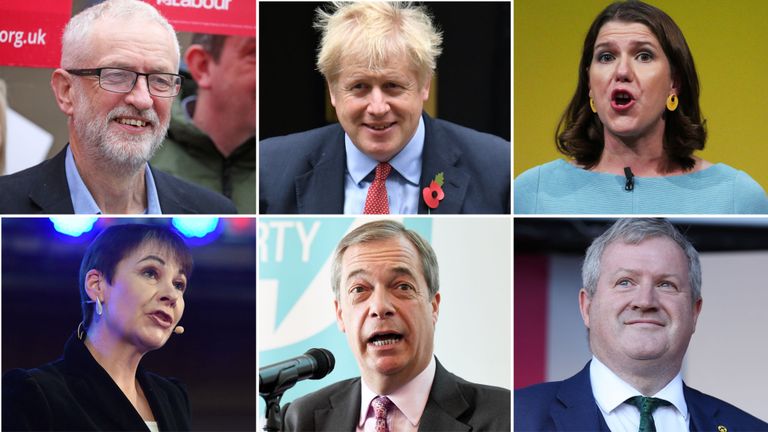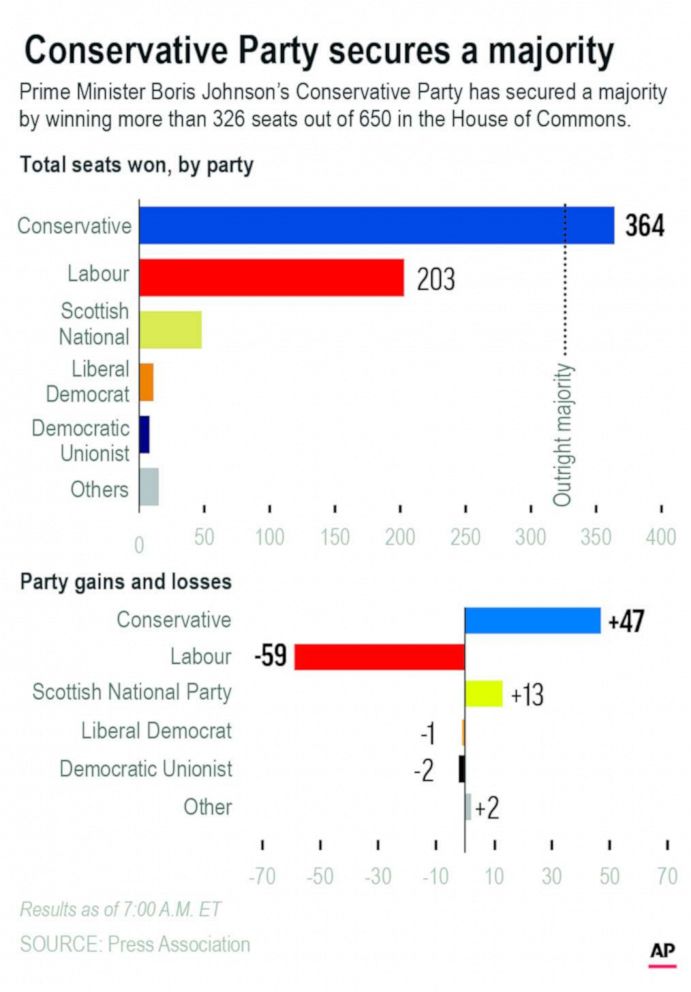
photo collage attrib. news.sky .com
For the third time since 2015, the electorate of the four nations that make up the United Kingdom of Great Britain came together on Thursday December 12, 2019 to form a governing legislative body. A process of parliament formation normally designed essentially to occur on five year intervals, the populous staggered toward this premature repeat performance based on a wrenchingly conflicted public perception as to whether a House of Commons still determined the destiny of the nation, or sensing the concept of nation having grown tired to the point of making the formation of a House of Commons a quant relic of the past, passively adjusting to a future decided ultimately by others. Parliamentary systems allow for individuals to identify with others who hold in common very specific views of life and destiny, ultimately leading to much fragmentation and the need for unstable coalitions for governance.
As in much of the rest of the world the issue became one of basically two life views, one which seeks security and outcome equality, and one which favors personal freedom and equal opportunity. Poorly defined as Left or Right, Progressive or Conservative, the democratic electorates of the world have aligned themselves in one camp or the other, and thus the outcomes of elections have become ever more polar. It becomes increasingly harder to imagine oneself in the universe of the other party, influenced or compromising with it, or reflecting a conversion of one’s ideals by actually voting for the opposite view.
Then, an idea like Brexit comes into being and the traditional boundaries are awash on the shoals. The British public found themselves in 2016 voting across party lines in a referendum vigorously unsupported by the party leadership of both the left and the right, in a stunning win for the concept of national destiny over supranational security. This fundamental issue subsumed all others to the point where arguing about taxes, health care, immigration, education and other polar issues of the left and right had become subservient to the destiny issue. The result was a schism in almost all parties along the Leave or Remain fault line, to the horror of the all the standard politicians who have lived in the realm pandering to like minded people who once loyally shared their universe. Suddenly, the Progressives were finding support in the landed gentry, and the Conservatives were sifting through the Midlands, Wales, and Scotland to seek industrial laboring commoners who would not normally give them the time of day.

The night of December 12th brought clarity to this schism, at least as defined by the voting public of Great Britain, if not attaching broader implications to other democracies. The left in Britain, found itself calamitously anchored on the seizing electoral deck to Jeremy Corbyn, a caricature of a sixties counterculture communista, promoting failed socialism of the 1970s and tolerating vailed anti-Semitic threats from the darker radical elements of his party, and counting on a supposed burgeoning emotional vote of youthful victimaholics and virtue signalers. Corbyn, like his party, remained paralyzed by the Brexit impulse. Traditional socialism would require release from many of the state capitalism tenets of the European Union, but the very youth he was counting on to drive his vote were generationally opposed to standing athwart the collective global impulses of a European superstate that sought to make obsolete quant national notions of unfettered destiny and individual freedom of action.
The Conservative Tories were equally conflicted. The Tory elite had assumed the attachment to the superstate a permanent reality, and stunned by the initial 2016 vote they had overconfidently reasoned would remove any notions that the nation would go its own path, were left in shambolic hypocrisy of delaying and deferring the Brexit date as many times as possible, in hopes the public would simply become exhausted by it and relent to staying. The David Camerons, Theresa Mays, and cadre of front bencher elites always saw themselves diminished by not being included in the EU club of elites, and couldn’t imagine an alternative world where the hobnobbing would have to be limited to crass Australians, Indians, or worse, Americans.
To this dysfunctional party came one Boris Johnson. A politician labelled as grossly undisciplined, disconnected to traditions of party, and borderline randy-ish, Johnson had almost uniquely positioned himself to be Prime Minister after the Brexit referendum of 2016 by being the solitary Brexiteer of the 2016 party establishment, only to clumsily flub his opportunity and provide the stunned elite to recover their senses and wedge their way back into the driver’s seat. This time however, Johnson showed the capacity to learn from his lack of discipline and took two massive risks that initially appearing foolhardy paid off as an electoral quinella. First, he declared for an immediate winter election that risked his fragile coalition and his position as prime minister while removing standing for all MPs that were anti-Brexit, and stated unequivocally that the primary impact of a Tory victory would be an immediate Brexit undertaking – no more delays come what may. Johnson saw intuitively that his clarity would confound the other parties, so afraid of the Brexit mentality straining the party base support on all other societal issues, while equally unwilling to come out as supporters of the EU, which they secretly and most assuredly were.
December 12th, 2019 brought clarity all right. It brought a smashing victory for Boris Johnson’ instincts and final vindication for the twenty five year struggle of Nigel Farage, the patron saint of Brexit. Farage’s self sacrificing gambit to “trust” Johnson’s commitment to Brexit, avoid safe Tory seats, and concentrate on Labour strongholds where Brexit wistfulness was high, was a dramatic contributor to Labour losing a spectacular 59 seats and Tory MP’s sweeping in to pick up the collateral. Almost alone over 25 years, Farage had brazenly driven the Brexit concept when it was laughed at by all elites and media sages – one can suggest now it is Farage who can have the last laugh.

Now the political leaderships on both sides of the pond are led by raffish, and sometimes buffoonish ubercharacters that seem to have an animal instinct as to the core impulses of their nations. We have been told for years that the science is settled, that new generations are interested only in their self reflection and their global need to blend in to truly feel secure. We have been fed this line by a compliant media that wishes it were true, and will do whatever it can to establish the ideal as a reality. Yet, time after time, the outcomes don’t fit the narrative, and free people keep upsetting the idea of inevitability. Boris Johnson now has his triumph. We will see if he can close the deal. In America, his doppelgänger is under massive attack by his own elite and media, that seeks to overturn what they are convinced was an immature spasm of the voting public in 2016 that brought the contrarian political Trump to stunning life. They are furious that in democracies, the clarity of righteousness is not always appreciated by a public that doesn’t always seem to understand the arc of history as they do.
If Trump survives, I suspect we will see a similar electoral thumping of the elites very well may be in the cards. Then, between Johnson and Trump, and the nascent Johnsons and Trumps watching with great interest in other democracies, things could really get interesting. Maybe freedom and its twin destiny are not quant relics of the past after all.
Once more into the breach, my friends, once more into the breach.

What are the odds that two great Western nations would, around the same time, elect a man with funny-looking hair to lead the country? Seriously though, I think we should hold our elections like the Brits do—with paper ballots.
One last thought: Nigel Farage weighed Boris’ Brexit (basically Teresa May’s deal with the backstop removed, a deal he once claimed was worse than staying in the EU) against another referendum and a Labor government, and chose the lesser of two evils. Let’s hope that in the end, Britain achieves a ‘hard Brexit’ and gets things back like the rights to fishing in their own waters.